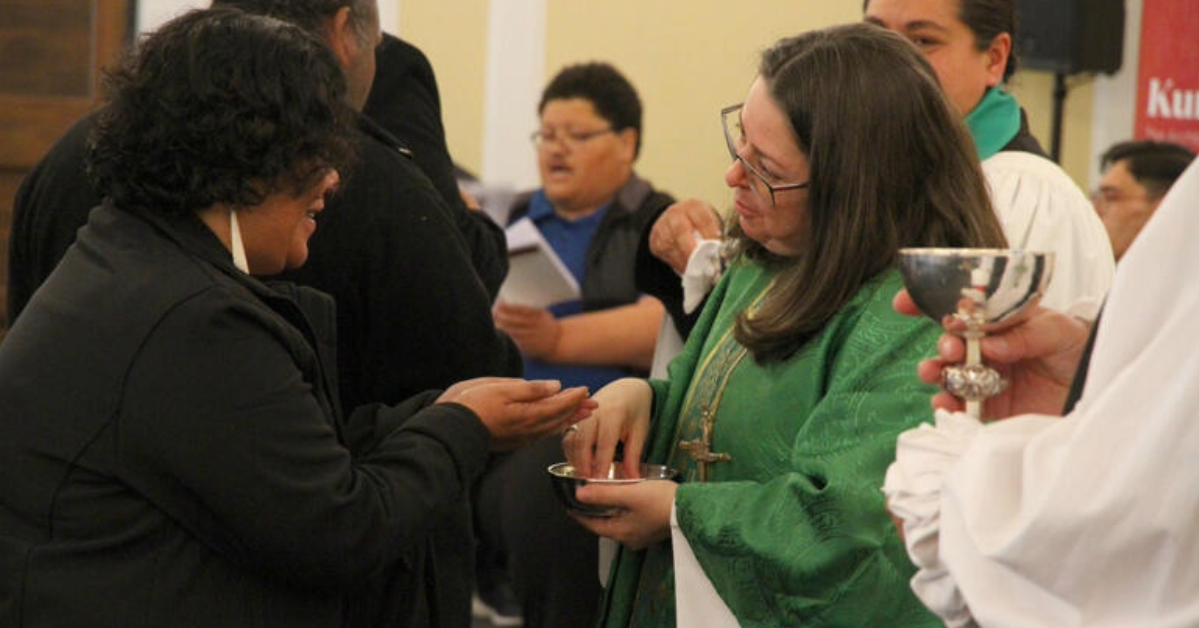Over 50 scholars and clergy ended three days of deep reflection, relationship, intention and action with closing words from Archbishop Don Tamihere and a Eucharist led by visiting Archbishops Chris Harper and Marinez Bassotto.
“Learning happens through a matrix of relations.” This was the observation of Hong Kong-born, US-based theologian Dr Kwok Pui Lan, at the close of the first day of the Anglican Indigenous Leadership Initiative (AILI).
Arriving that afternoon as strangers, from indigenous cultures that have little contact with one another, delegates taking part in the AILI departed on Wednesday the 27th September as friends, colleagues and kin, each one with fresh knowledge and understanding to take home to their respective nations.
During the mihi on that first day, leaders had been asked to share their whakapapa (genealogy), their background, a view on leadership and a food that reminded them of home. Answers were both familiar – banana loaf, chicken curry, kamokamo, rewena – and more foreign. Acai berries, collard greens, hot buttered popcorn and moose steak all featured from those who had travelled the furthest.
Archbishop Tamihere says spending time getting to know one another during this special introductory afternoon set the tone for the AILI and its ultimate success. “Methodology is as effective as outcomes,” he says. “There is no journal, no book on what it means to be an Anglican leader in light of indigeneity. We are writing it, now, through wananga – and building relationships is the first step we take.”
The final morning began with workshopping three important aspects of leadership as they pertain to indigeneity and Anglicanism.
Dr Jenny Te Paa-Daniel (Ōtepoti) led a group discussing theological education, and how it could be reshaped in a “redemptive solution” to the current situation, which is, in some cases, a traumatising experience for indigenous scholars.
It was suggested that a kaitiaki group establish to ensure priorities are identified, met and regularly reviewed – these could include an audit of the current education landscape (everything from informal bible study to theological qualifications), identification of training opportunities required, leading cross-sector collaboration, and removing whakamā (shame/stigma) and elitism from educational opportunities. “We want to guarantee success, so that our scholars take their rightful place within the academies of the world,” concluded Dr TePaa-Daniel.
Archdeacon Susan Wallace (Te Waipounamu) reported back on her group’s interrogation of governance and structure, mooting a local coalition, seeded by those attending AILI, that would meet annually. “Through collective self-determination, we would work towards a transformation of institutions. We might offer indigenous governance training and intentional mentorship, opening our arms to other indigenous people within our Communion and across the world.”
Simon Heath and Vianney Douglas spoke of transforming kura, the possibility of creating an indigenous curriculum “and bringing in both educationalists and students to understand, what are the underlying values? What is the graduate profile, what are our children’s hopes on graduation? Investing in them now means they can be the focused leaders we hope for.”
Closing remarks from Archbishop Tamihere suggested leaving the wānanga having reframed what it means to be indigenous, to be colonised, to be controlled. “These are words that relate to negativity. What if we decide to develop a pedagogy of the free? Then, our theology would not speak of being oppressed, imprisoned, subjugated. What would that look like?”
“Here, you’ve become the founding establishment of a global wānanga of loving people. Thank you for being here and spending time and sharing.
“The one connecting thread that draws us together is friendship. Whanaungatanga, mātaraunga, indigeneity, and the idea of kaitiakitanga. It’s all been slowly forming, here, as in Mark chapter 4. Jesus tells us to scatter good ideas. Some will land on paths and not take root, some will land on brambles and suffocate, some will be stolen away by the birds of the air, but some will fall on good soil. We trust in that process, and it’s been deeply inspiring to observe that.”
The three-day wānanga concluded with the Eucharist, and Archbishop Chris Harper’s sermon urging delegates to take their messages, developed at the wānanga, to the world. “We have been very blessed to be able to gather under one roof, in one house for a short while. To share our commonalities, our prayers, our voice and our song. At the very beginning, I offered this message: that we all have one song, a song that all of us sing with one voice. And that is our life experience.
“You are the ambassador. The Almighty blesses you and has given you these gifts, these words, these steps and this moment.”
Image: Archbishop Marinez Bassotto. Photo Credit:Julanne Clark, Anglican Taonga.
